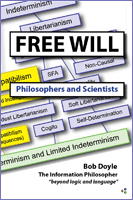Publication Date: June 19, 2011
Country of Issue: United States
Category: Academic and professional books
Field: Philosophy

|
Release Date: July 1, 2011 Publication Date: June 19, 2011 Country of Issue: United States Category: Academic and professional books Field: Philosophy |

|
|
Coming this Fall and Winter from i-Phi Press:
Free Will: Philosophers and Scientists (September)
Free Will: The Core Concepts (December) |

|

|